(In which series I intend to watch every Planet of The Apes movie ever made, beginning with the original classic, Planet of The Apes, and continuing through summer 2014′s newest entry in ape-lore, Dawn of The Planet of The Apes. Join me, and we will lose our pitiful human minds together.)
It saddens me to say that the latest entry in the world of the apes, Dawn of The Planet of The Apes, is, at best, average. I had high hopes after rewatching its predecessor, Rise of The Planet of The Apes, and after noting the many early reviews proclaiming Dawn the best sequel since The Empire Strikes Back, but this is no Empire. It’s a serious movie with a lot on its mind, but falls quickly into cliché, undercutting its impact, and giving it a ponderous feeling of bloat. Its worst crime? It’s no fun.
Dawn begins well. Following a brief, newscasty “this is what’s gone down the past ten years since the plague hit and wiped out humanity,” we find ourselves among the redwoods with Caesar’s troop of apes, mostly chimps, on a hunt. We meet Caesar’s son, Blue Eyes (Nick Thurston), and Koba (Toby Kebbell), whom we first saw in Rise, a victim of excessive human lab-work. Caesar is once again played by Andy Serkis, who gives yet another brilliant simian performance. Kebbell is just as good as his eventual nemesis.
Post-hunt, the apes relax in ape-village, a city cunningly crafted in wood among the trees on a hillside overlooking a waterfall. You know, the Muir Woods Waterwall? The secret waterfall? Oh, it’s in there. The apes speak almost solely in sign language. Maurice (Karin Konoval), the circus orangutan, is back, and teaches the children such important—and classic Apes series—lessons as “ape not kill ape.” Three such lessons are written on chalk on a stone. One reads, “Knowledge is” with the last word obscured. “Power,” perhaps? I sat there hoping it was “good,” that being the quote attributed to Emil Faber, founder of Faber College, in Animal House.
Right? Animal House? Get it? Who’s with me?
Caesar and Maurice wonder if any humans yet exist. It’s been two years since they saw one. Which is strange. It takes them no time at all to reach the Golden Gate Bridge. They haven’t bothered to check the city in two years? Where not surprisingly some hundreds of humans still live?
So a small contingent of five humans strolls into the woods one day. One of them, Carver (Kirk Acevedo), runs into Blue Eyes and his buddy, Ash. Carver is scared crazy, pulls a gun, and shoots Ash, winging him. Which brings about a hundred apes swinging up to greet Carver and his friends, led by nice guy Malcolm (Jason Clarke), who immediately recognizes that these are not normal apes, even before Caesar yells “GO!” at them. They go.
Back in San Francisco, Malcolm meets the co-founder and co-leader of their survivors colony, Dreyfus (Gary Oldman), and tells him that the mean, smart, talking apes would prefer they keep out of the woods. Which is a problem, because the humans, who live crammed together in the remains of the Galleria shopping mall, need power, and fast. Their gas is two weeks away from running out.
Why do they live in one spot? If they’re immune to the plague, no one can infect them, and they know of no other survivors, so it’s not like roving bands of killers are out to get them. Why not spread out in a nice Russian Hill mansion?
Anyway. There’s a hydroelectric station on the Muir Woods Secret Waterfall, and they want it fixed and turned on. What to do about the apes?
Koba tells Caesar that if there’s a weak band of power-needy humans nearby, they should kill them quick. Caeser’s not so sure. Instead he has the apes, some on horseback, march into the City and tell the humans to keep away. It’s an impressive show of force. And of talking. The humans bug out.
Dreyfus wants to open up the armory and kill the apes. Malcolm asks for a few days to see if he can work out a deal.
So we see where this is going. And so far, the movie works. It sets an ominous tone, the apes are potentially complex characters, and it looks great. The CGI ape effects are stunning. I kept getting lost in Maurice the orang’s hair. It’s got to be the best CGI hair yet. Some of the background apes are less detailed, but that’s another Apes tradition. In the old movies, the background chimps look like they’re wearing cardboard masks.
As bad luck would have it, or as contrived screenwriting would, the one guy with an insane hatred of all things ape, Carver, is also the one guy who knows how to get the hydroelectric station working. Drat! He and a few others accompany Malcolm, who makes a deal with Caesar.
It all goes swimmingly until Carver pulls a gun, tensions flare, etc. Things are tense.
Meanwhile, Koba and his henchapes cross the Bridge to Fort Point to find the humans breaking out their vast stockpile of weaponry. Koba is spotted by a couple of assheads. They’re about to shoot him until Koba puts on a silly dancing chimp act. They laugh him off. A nice moment.
Now what happens next is what took me out of this movie. SPOILERS coming up:
Koba wants war, but Caesar continues to help the humans. Even after hearing about the arsenal? What, is he crazy? No. Because Koba doesn’t tell him about the arsenal. Instead he concocts a plot to shoot Caesar dead himself, and frame Carver for it, thus igniting war. Which is to say that Koba is simply power-mad.
I don’t buy it. Koba isn’t pushed far enough to kill Caesar. Which means the movie is saying he’s bad from the start. It’s implied that what Koba wants is revenge, and rightfully so, for what humans did to him. But why kill Caesar? The movie didn’t bring me there emotionally in the least. Koba’s character is pushed and pulled by the writers without regard for consistency. Why wouldn’t Koba kill Caesar’s wife and frame Carver for that? An easy enough way to convince Caesar of human treachery.
So Koba shoots Caesar, and leads the apes to war.
The war scenes are loud and impressively animated, but with Caesar gone, and with the apes portrayed as the bad guys, I lost interest.
What I like so much about Rise is that it’s about human hubris and blindness leading to our own destruction. Maybe I’m giving the screenwriters too much credit; maybe they meant for James Franco to be genuinely seen as a nice guy; maybe they didn’t want he and Freida Pinto to come off as buffoons unable to perceive their own evil. But that’s how it plays to me, and thematically it works.
In Dawn, the humans are essentially all good guys. Even Dreyfus, the ostensible human counterpart to Koba, is willing to give Malcolm time to work out a deal. And it works! The power comes back on. Would the humans have waged war anyhow? Knowing humans, yes. But we don’t see this happen. We see Caesar shot by an ape, and we see Dreyfus calling in the army only after the apes attack. (They call in the army? There’s still an army? And they haven’t bothered to check for survivors in San Francisco? What are they doing, checking Barstow and Grass Valley first? “Hey you guys, nobody left alive in Needles! Guess we’ll just hole up for now.”)
Of course Caesar doesn’t die. The good humans stitch him up. He has a final showdown with Koba, one consisting of nothing but boring action movie clichés. Two guys punch each other on top of a building until one is left hanging by an arm off its edge. Even though he’s a chimp, and could swing himself up with no problem. Do you know how strong chimp arms are? There’s even the obligatory moment where Koba asks Caesar to save him. And Caesar takes his hand. And drops him to his death. What is this, Die Hard?
Dawn is scripted by Mark Bomback, who wrote Live Free or Die Hard. And the Total Recall remake. It’s based on a script by Rise writers Rick Jaffa and Amanda Silver. Director Matt Reeves (Cloverfield, Let Me In), who replaced Rise director Rupert Wyatt, didn’t like the story, and brought Bomback on to rewrite it. I don’t know how much dialogue he changed, but what’s left is wooden and predictable.
Why have an action movie fight at the end? Why not have a chimp fight? Why not have Caesar tear out Koba’s throat with his massive chimp teeth? Too mean?
In Rise, Caesar learns he’s an individual, unique from humans, and no less deserving of dignity. He fights for his freedom and wins it. In Dawn, we’d expect him to learn that humans and apes can’t live in peace, that war is inevitable, and that he must lead the fight. That would be quite a change, from a proponent for peace to a leader of war.
This is not what happens. The decision to wage war is taken from him by Koba. The end has Caesar essentially sighing and saying, “Alas, I’ve learned that apes can be as rotten as humans, so that’s that, I guess we’ll just have to fight each other. Hate to do it, but my hands are tied.”
How limp is that? The filmmakers seem hellbent on making Caesar as likeable as possible and in so doing they remove his agency. Caesar doesn’t drive the story. He’s a passive observer. For a lead character in a film, this is dramatic death, and it’s why the movie loses all its steam in the last third.
Sure, it’s a parable, it’s two cultures living side by side who refuse to make peace and get along, it’s human nature, and apes are humans too.
That’s all well and good, but you need a character to drive the story, and that character is Caesar, and Caesar doesn’t drive anything. The movie is at war with itself.
What this story demands is Caesar doing everything he can to obtain peace, Koba doing what he can to insist otherwise, and human stupidity and blindness convincing Caesar to fight. It should play out like The Godfather. Caesar, like Michael, not wanting to get involved until feeling he has to, and then? Then going at it with everything he’s got. Turning from a sympathetic character into a monster. Caesar’s wife should have been killed. Or his newborn.
Human culpability plus Koba scheming and killing Caesar’s wife? There’s your story. Anything to make Caeser DECIDE to go to war, to CHOOSE the inevitable: that war is the only answer.
A depressing “inevitability” to accept, but that’s what this story is, isn’t it? Isn’t that the whole point of these movies? We destroy ourselves, apes take over—and they’re just like we were!
Dawn of The Planet of The Apes. Rise? Dawn? What’s next, Sunup On The Planet of The Apes? They’re going to need better titles for future installments. Which yes, of course I’ll see. I’m a sucker for apes. But this one was a disappointment, more so in that it begins well, then slowly falls apart into grim, ponderous cliché, its lead character reduced to watching from the sidelines while events are decided around him.
The Going Ape series:

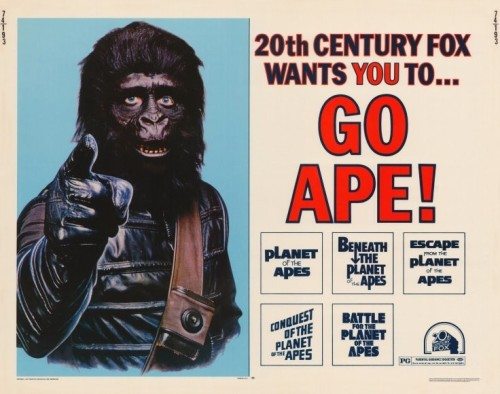
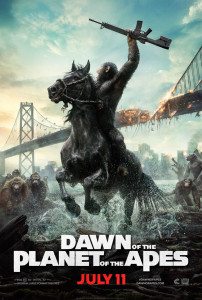
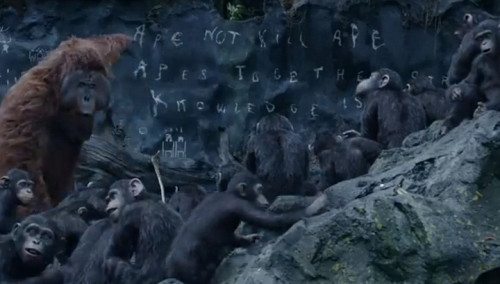
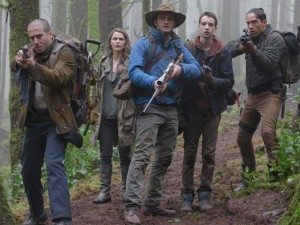
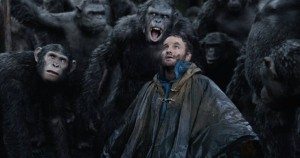
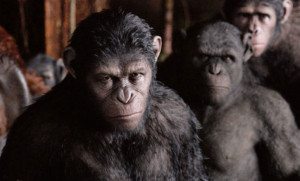
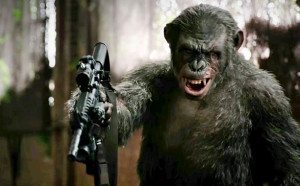
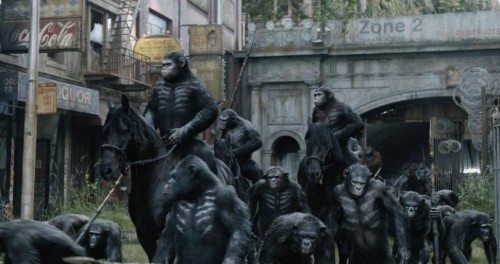
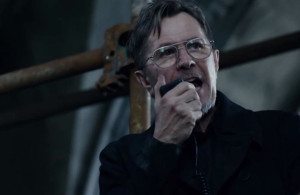
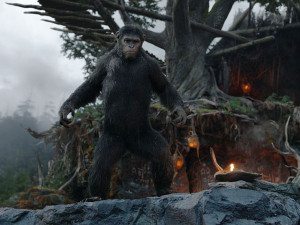
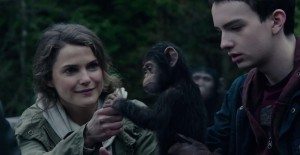
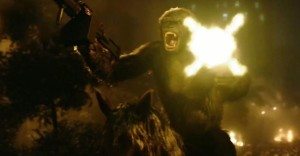
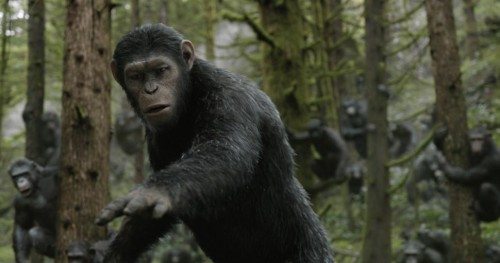
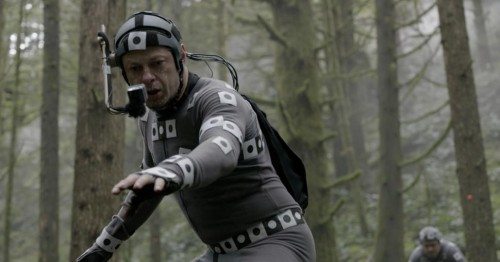
And furthermore, once you have Koba kill Caesar’s wife, and Caesar leads them to war, and once they’ve won and taken humanity captive–THEN Caesar learns it was Koba who killed his wife, and THEN they have a fight. Caesar would be even angrier with Koba than he is for being shot at himself, because not only did he kill Caesar’s wife, but doing so turned Caesar into the warrior he never wanted to be! They’d have a monstrous chimp fight, Caesar wins, and then–THEN he realizes the same thing as in the movie, that war has begun, there’s no turning back, his hands are tied–ONLY HE TIED HIS OWN HANDS. It’s HIS fault, HIS doing. Bam! Actual dramatic weight and meaning.
Okay. I’ll go think about something else now.
it’s that same inevitability that will see me walk to the cinema despite a reasonable tiredness of wars with apes. It’s inevitable. Must go and see …
I’ve skipped the whole thing.
Brain manipulation aside, it takes years to develop true marksman skills. Handing an M4 or an M249 to a monkey who can suddenly read Shakespeare won’t make him into an effective modern battlefield soldier.
I could shoot the whole damned rabble down by myself. I’ve got an A-1 immune system, so count on me to survive an outbreak. I find the whole premise to be a nonstarter, as there are literally MILLIONS of men and some women just like me, with actual firearm skills, the ability to make a firearm from billet or scrap metal, fabricate and reload ammunition, and create night vision from discarded camcorders. You can count on the fact that some of “us” would have survived the “plague”, particularly the civil unrest part of it. Human beings are, after all, more than just “monkeys in pants”… And far more dangerous when leveraged by technology with decades of practice to boot.
Apes + Guns Vs. me + guns = Lots of Dead Apes
As a result I find these movies unwatchably stupid.
I also thought this film was pretty dumb, but not because they failed to account for your marksmanship and survival skill.
Apes w/o guns + you w/o your guns for 2 seconds = you in lots of pieces spread over a wide area
Wet ape vs. me with bare hands = dead me
You are absolutely right! (always bring more than one gun to a knife fight, etc.)
I did have a thought that DRY apes would be very… flammable.
:)
The main jist of my criticism was that the apes were shown in a parity space with humans when it came to technical augmentation in warfare. This is why (apes minus intellect vs. men with guns in the Congo = soon to be no apes at all).
I think there is a fundamental misconception about the nature of a knife, a sword, a gun, or a hand grenade. ‘All a person has to do is walk up to one, pick it up, and they are an instant killing machine.’ This misconception exists in the minds of the ignorant. It has become a useful meme in the hands of those that seek to magnify their own power by vilifying the very tools they wish to keep only for themselves. The contrasting truth is that is takes motivation, dedication and practice to use anything, even your fists, in an effective way for warfare or otherwise.
It appears to me that policy makers have either an agenda or mistaken beliefs regarding martial instruments. There have been multiple comments regarding an anti-gun agenda theme in the monkey movie. There is a message being sold that guns (or weapons in general) CAUSE violence. A casual perusal of human history will show violence in all known eras. With that thinking, we need to ban all rocks, bone shards and sticks with points on them.
I find a deep irony in Charlton Heston and Michael Bloomberg being in these movies over time.
Actually, you didn’t see the film, right?
Sounds like your concerns – valid or not – are misplaced in this case. There is no instant gun expertise nor is there an anti-gun agenda; more a comment on violence and how it is our downfall. One doesn’t need to be pro or anti gun to regret the escalating nature of incivility.
In these films the apes are just analogues for humans, allowing us some perspective on ourselves.
We are in complete agreement.
The best case scenario for a gun, or any other potential for violence, is that it goes unused, except as a deterrent to miscreants of all types.
I have seen the OTHER ape movies, and have decided against seeing any more, unlike the reviewer.
I will say this: I’ve witnessed people who pose little threat to anyone but themselves extol their own supposed virtues of restraint or pacifism. You have not been sufficiently tested until you have the MEANS for violence at your disposal, and STILL resist the temptation to apply it except in the most dire & appropriate circumstances.
That’s a particularly interesting comment in light of this film (which is still a bit lame) but which addresses when violence is called for.
It also reminds me that I still need to watch Straw Dogs.
You seem very interested in this movie that they didn’t make that is in your head. Which is all well and good. Meanwhile, this was the best ape movie they’ve made so far. It was damn good, and did not fall flat in the final third. Things led logically to other things and drama built in an organic way and in general, the audience was not treated as stupid. Plus, it was shot and conceived beautifully, unlike pretty much any Hollywood movie this year.
Yes, not every detail of the setup made perfect sense. I also don’t really see how there are little to no humans left in the world in this scenario, but once you’re on board with the premise, the thing plays out very well.
Sad for you that you are a screenwriter and can’t stop tinkering in your mind.
No you are sad! So there!
Well, Mr. Fancy Pants, I’ve said it before and I’ll say it again, the part where I watched the movie was just that: me watching a movie, one which kept me interested to a point, and then lost me. Which indeed fell flat in the last third, if not a bit throughout. Or so I, and such luminaries as the Evil Genius, felt.
After that comes the part where I think on it, and what I wrote above is one way, given what they were setting up, I think it would have worked out quite a bit better.
Given the story they did tell, it didn’t work for me. So there we are. I think they were too caught up in their allegory of clashing cultures to make either culture sufficiently compelling. Check out HULK’s take on the failure to make the human half of the story effective for yet another angle on why the movie was disappointing overall. (Or, possibly, don’t.)
Looks like you guys are out of a job.
http://www.theonion.com/video/the-onion-reviews-dawn-of-the-planet-of-the-apes,36436/